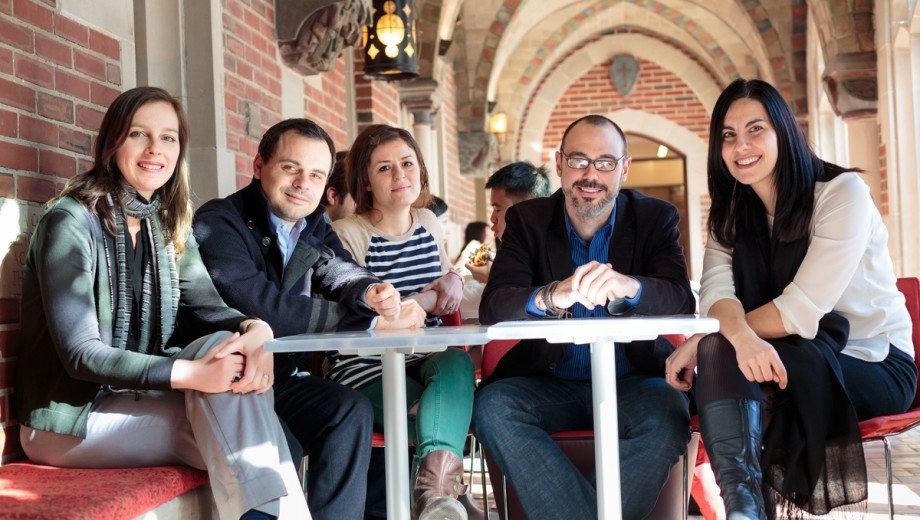“My way of approaching reality was always filtered by literature,” says Maria Anna Mariani, one of six assistant professors in the Department of Romance Languages and Literatures. “This is the only thing I could do.”
Mariani is part of a department that offered its first classes in 1893, with a five-person faculty studying language and literature in Spanish, Catalan, French, Portuguese, and Italian. Today the department has grown more than fivefold from its origins, with research interests that regularly intersect with cinema and media studies, philosophy, and literary theory. The six assistant professors, says department chair and Frank L. Sulzberger Professor Larry Norman, reflect a “new generation of innovative scholars” representing “the future of a field whose multilingual reach is truly transhistoric and global.”
This innovative scholarship extends to classic topics like the Renaissance. Although today we see the Renaissance as a golden era of ideas and culture, according to Rocco Rubini it wasn’t always so simple. His 2014 book, The Other Renaissance: Italian Humanism Between Hegel and Heidegger, outlines how nineteenth- and twentieth-century Italian intellectuals incorporated Renaissance philosophy into their own thought, often with surprising results.
As one example, during the Italian unification, or Risorgimento, in 1861, many rejected the Renaissance and viewed Renaissance thinkers—leading lights of modernity like Petrarch and Leonardo Bruni—as failed statesmen. “Italy inaugurated modernity but unified last politically,” says Rubini. These nineteenth-century revolutionaries believed Italy’s inability to unify earlier proved a failure of Renaissance ideas. “It took a while,” Rubini notes, “to get to the Renaissance period as a ‘great’ period.”
Rubini’s interest in tracing the Renaissance in the Italian intellectual tradition connects two of his long-standing interests: Renaissance literature and literary theory. Having taught at UChicago since 2009, he tries to make similar connections for his students in the classroom. “To study Italian literature,” says Rubini, “is to study the beginnings of modern poetry, how we came to write in prose, and the birth of the short story or novella.”
 Three of the six assistant professors—Mariani, Laura Gandolfi, and Victoria Saramago—specialize in modern Italian and Latin American literature. Mariani, who arrived at UChicago in 2015, studies the theme of trauma and survival in the works of Italian authors like Primo Levi. She was influenced by the words of Nobel laureate Elias Canetti, who wrote in his Crowds and Power, “The moment of survival is the moment of power.”
Three of the six assistant professors—Mariani, Laura Gandolfi, and Victoria Saramago—specialize in modern Italian and Latin American literature. Mariani, who arrived at UChicago in 2015, studies the theme of trauma and survival in the works of Italian authors like Primo Levi. She was influenced by the words of Nobel laureate Elias Canetti, who wrote in his Crowds and Power, “The moment of survival is the moment of power.”
In many of the texts she has studied, survivors move between feelings of power in having escaped death on one hand, and a heightened sense of vulnerability and loss on the other. This opposition is at the center of Mariani’s research, extending beyond the borders of Italian literature and incorporating elements of philosophy, comparative literature, and the social sciences. “My approach to problems is theoretical,” she says, “and not too geographical.”
Also interested in theoretical matters but in a different region, Laura Gandolfi investigates the presence of objects—ranging from pre-Columbian antiquities to imported goods from Europe—in Mexican literature and literary texts after independence. Gandolfi, who joined UChicago in 2013, hopes to finish revisions on her book this year as a Franke Institute for the Humanities Faculty Fellow.
Her research focuses largely on texts from the turn-of-the-century Latin American modernismo movement. Studying the role of objects within texts, she says, “can say a lot about the function of literature.” Using a variety of sources like crónicas—a Latin American form of writing including essays, fiction, and nonfiction in one volume—as well as journals, letters, and advertisements, Gandolfi traces the construction of Mexico as a place in fiction and reality.
Another Latin American literature scholar, Victoria Saramago, researches twentieth-century Brazilian regionalist novels to investigate the relationship between literature and environment. Saramago, who arrived at UChicago in fall 2015, is interested in the way the regions depicted in these novels shape the materiality—the form, subject, or conventions—of the text.
Saramago is also a published fiction writer. Although her writing is more contemporary and plot-based than the writers she studies, Saramago can see the influence of her research on her fiction. “Certain ideas come up in very different forms,” she says.
Miguel Martínez, at UChicago since 2011, and Larissa Brewer-García, a fall 2015 arrival, both study sixteenth- and seventeenth-century Spanish texts but on different continents. Martínez researches writings by Spanish soldiers, while Brewer-García focuses on black Africans in Colombia, Peru, and Ecuador. Despite the difference in subject matter, “we have a lot of points of conversation,” notes Brewer-García.
Brewer-García highlights the presence of black Africans—both enslaved and free—and their participation in civic and cultural life as interpreters of histories, plays, trials, and religious texts. By studying their translation work, she says, we can see how they “participate in shaping what it means to become black in the Americas.” Black Africans’ exclusion from historical sources in the colonial period “has similarities with the exclusion of black populations from national imaginaries,” Brewer-García notes. As a native of Colombia, she adds, “it is something that matters to me.”
Martínez’s research indicates that Spanish soldiers were more politically attuned and less monolithic than previously thought. In their writings, “many soldiers use highly complex literary traditions,” such as epic poetry, to raise questions about political protest, empire, and violence.
“I enjoy archival work the most,” Martínez says. His research has taken him to archives throughout Spain and a new project on the Spanish empire in East Asia will take him to Mexico and the Philippines. “Writing is fun—sometimes,” he adds with a laugh. But he finds “the real excitement of finding material, discovering the unknown,” in the archives.


Comments
Africa en el Caribe o el Caribe en Africa
Felicitaciones a todos por tan importante trabajo que aporta a la filosofia , y a todas las ciencias como la antroplolgia, la etnologia , la historia... sin duda la literatura es el hilo conductor para dilucidar por medio de palabras pensamientos, memorias y emociones.
Add new comment